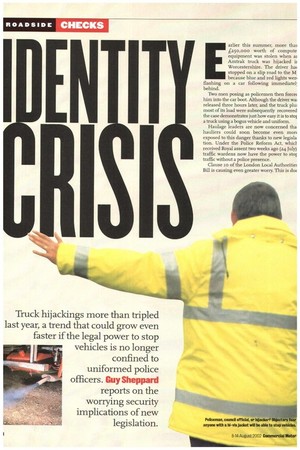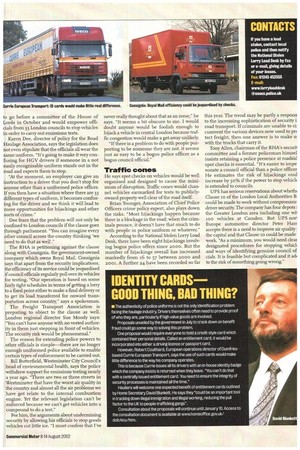E arlier this summer, more thai £25(),(3(50 worth of compute equipment
Page 38

Page 39

If you've noticed an error in this article please click here to report it so we can fix it.
was stolen when ai Amtrak truck was hijacked ii Worcestershire. The driver ha( stopped on a slip road to the M. because blue and red lights wen flashing on a car following immediate!: behind.
Two men posing as policemen then force( him into the car boot. Although the driver wa: released three hours later, arid the truck plu: most of its load were subsequently recovered the case demonstrates just how easy it is to stoi a truck using a bogus vehicle and uniform.
Haulage leaders are now concerned tha hauliers could soon become even moil exposed to this danger thanks to new legisla tion. Under the Police Reform Act, whicl received Royal assent two weeks ago (24 July) traffic wardens now have the power to stor traffic without a police presence.
Clause rci of the London Local Authorities Bill is causing even greater worry. This is du(
I
tu go before a committee of the House of ords in October and would empower offifrom 33 London councils to stop vehicles order to carry out emissions tests.
Karen Dee, director of policy for the Road aulage Association, says the legislation does ot even stipulate that the officials all wear the ame uniform. "It's going to make it very consing for HGV drivers if someone in a not asily recognisable uniform stands out in the oad and expects them to stop.
"At the moment, an employer can give an ' truction to a driver that you don't stop for nyone other than a uniformed police officer. f you then have a situation where there are 33 ' erent types of uniform, it becomes confusg for the driver and we think it will lead to ore opportunities for hijacicings and other orts of crime."
Dee fears that the problem will not only be onfined to London councils if the clause goes ough parliament. "You can imagine every ther council across the country thinking we eed to do that as well'."
The RHA is petitioning against the clause ong with Consignia, the government-owned ornpany which owns Royal Mail. Consignia ys that apart from the security implications,
efficiency of its service could be jeopardised council officials regularly pull over its vehicles or testing. "Our operation is based on some ' ly tight schedules in terms of getting a lorry a fixed point either to make a final delivery or o get its load transferred for onward transstation across country," says a spokesman.
The Freight Transport Association is reparing to object to the clause as well. London regional director Sue Moody says: "You can't have anyone with no vested author*ty in them just stepping in front of vehicles.
e security risk would be phenomenal."
The reason for extending police powers to other officials is simple—there are no longer enough uniformed police available to enable certain types of enforcement to be carried out.
Bill Butterfield, Westminster City Council's head of environmental health, says the police withdrew support for emissions testing nearly a year ago. "There are two or three streets in Westminster that have the worst air quality in the country and almost all the air problems we have got relate to the internal combustion engine. Yet the relevant legislation can't be enforced because we can't get vehides into a compound to do a test."
For him, the arguments about undermining security by allowing his officials to stop goods vehicles cut little ice. "I must confess that I've never really thought about that as an issue," he says. "It seems a bit obscure to me. I would doubt anyone would be foolish enough to hijack a vehicle in central London because traffic congestion would make a get-away unlikely.
"If there is a problem to do with people purporting to be someone they are not, it seems just as easy to be a bogus police officer as a bogus council official."
Traffic cones
He says spot checks on vehicles would be well organised and designed to cause the minimum of disruption. Traffic cones would channel vehicles earmarked for tests to publiclyowned property well clear of the road itself.
Brian Younger, Association of Chief Police Officers crime policy expert, also plays down the risks. "Most hijackings happen because there is a blockage in the road; when the criminals pounce, it doesn't have that much to do with people in police uniform or whatever."
According to the National Stolen Lorry Load Desk, there have been eight hijackings involving bogus police offers since 2000. But the number of hijackings overall has increased markedly from 16 to 57 between 2000 and 2001. A further 24 have been recorded so far
this year. The trend may be partly a respons to the increasing sophistication of security i road transport. If criminals are unable to d: cumvent the various devices now used to pn tect freight, then one answer is to make o: with the trucks that carry it.
Tony Allen, chairman of the RHA's securii committee and a former policeman hitnsel insists retaining a police presence at roadsid spot checks is essential. "It's easier to impe sonate a council official than a police officer He estimates the risk of hijackings coul increase by 50% if the power to stop vehich is extended to councils.
UPS has serious reservations about whetht Clause to of the London Local Authorities B. could be made to work without compromisir driver security. The company has four depots i the Greater London area including one wii ioc) vehicles at Camden. But UPS nonl Europe automotive director Peter Han accepts there is a need to improve air quality : the capital and that Clause to could be made work. As a minimum, you would need clew designated procedures for stopping vehicli and ways of identifying genuine council of cials. It is feasible but complicated and it adi to the risk of something going wrong."
















































































































































